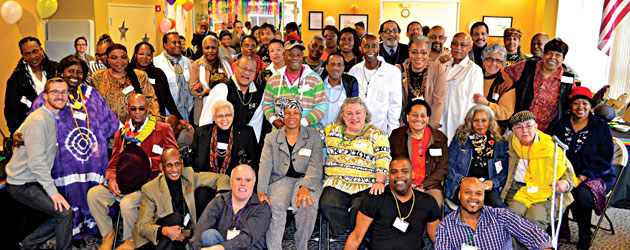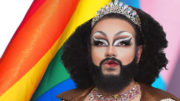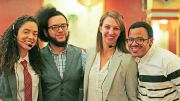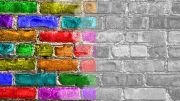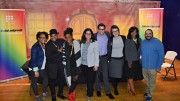By: Nicole Lashomb/Editor-in-Chief –
BOSTON, Mass.— Alarming statistics in the LGBT elders of color population nationwide has prompted local organizations to tackle disparities as this population is projected to double in the coming years. According to the U.S. Department of Health and Human Services’ Administration on Aging , the LGBT elders of color population is projected to increase by 217 percent by 2030, compared with 81 percent for the older white population.
“In the coming years we will see tremendous growth in the population for two reasons—first the baby boom generation will increase the number of all older adults, including LGBTs,” said Lisa Krinsky, Director of Fenway Institute’s LGBT Aging Project. “Second, this is a more visible; post-Stonewall generation, many of whom have lived their lives as out and visible. Services and providers will see and feel this growth and need to be inclusive when working with this population.”
These spikes in the LGBT aging population will contribute to roughly 3 million LGBT older adults living in the U.S. by 2050, according to Services & Advocacy for GLBT Elders (SAGE)*. Nearly 40 percent of LGBT elders by this time will be Black, Latino, Asian and Pacific Islander, and American Indian and Alaska Native people.
The LGBT Aging Project and Boston’s LGBT Elders of Color Group strive to meet the needs of older LGBT people of color now. Through a collaboration that brings together people with shared identities, a social support program, known as Flashback Sunday, has emerged.
“For years we weren’t reaching many LGBT older adults of color,” said Krinsky. “When we partnered with key stakeholders in this community, we found tremendous need for spaces that recognize the intersection of being old, being LGBT and being people of color.”
Involving the LGBT elders of colors was a decision well thought out, according to Bob Linscott, Assistant Director of Fenway Institute’s LGBT Aging Project.
“Since 2013, we have been actively focused on an initiative to engage LGBT elders of color and that program, Flashback Sunday, has taken off like wildfire,” said Linscott. “Folks who attend Flashback Sunday report that, for the first time, they feel like there is a place for them to be black, LGBT and older.”
Shirley Royster, Co-chair for LGBT Elders of Color/Flashback Sunday explained how the services and access for aging impacts LGBT people of color when compared to their white counterparts.
“Statistics show that health outcomes are more positive for non-people of color,” she said. “Services and resources are more readily available to others and they live longer. Income levels tend to be higher for non-people of color which afford them access [options] to better services.”
According to SAGE’s Health Equity 2013 report, research depicts that LGBT elders of color often face increased health disparities and are an invisible population, forcing the group to enter into retirement without the necessary support for healthy aging. Additionally, discrimination and intersectionality of race, ethnicity, gender, and LGBT identity, among others, add to the challenges of the aging experience.
“Social services at aging programs are not responsive to the needs of people of color [and] prior to our LGBT Elders of Color Group, there were no social outlets that targeted our specific population,” said Paul Glass, Co-chair, LGBT Elders of Color/Flashback Sunday.
Flashback Sundays provides an outlet for LGBT elders of color and allies to gather and share experiences in a safe and inclusive environment. Current programs are failing the LGBT seniors of color, Glass said.
“The aging concerns of LGBT elders of color are virtually absent in national policy discussions on aging, health and economic security,” the SAGE report continued. “Many LGBT elders of color face heightened financial insecurity. Recent studies have found that more than 90 percent of Black and Latino elders do not have enough income to sustain them throughout retirement.”
Royster and Glass explained the needs of the Commonwealth’s LGBT Elders of Color community.
“[They include] affordable housing and assisted living facilities, information on how to access necessary resources, more home care resources, assistance to maintain independence to continue living in their homes, training providers who are culturally competent to address needs with respect, including those of the transgender population,” they pointed out. “Additionally, more services are needed to better outcomes that address mental health and marketing efforts that are inclusive by reflecting images of LGBT aging people of color.”
Local leaders agree that inclusivity is critical to serving this diverse population, a population often deemed invisible.
“This only shows how much more work we have to do to be a truly inclusive state …” Linscott said.
Social isolation is a serious concern that affects LGBT older adults in unique and disproportionate ways, Linscott furthered.
“They are twice as likely to live alone, twice as likely to be single and 3-4 times less likely to have children—and many are estranged from their biological families,” the SAGE report confirmed.
Superficial changes are not the answer, explained Linscott. Acceptance and understanding of the community is critical.
“We often say that the next major focus is consumer education—meaning a whole new approach to LGBT Aging education aimed at mainstream seniors,” Linscott said. “It won’t do any good if every senior center flies a rainbow flag and their staff has been trained. If they [LGBT elders] are not accepted by their peers, they will be forced to stay isolated at home, hence, back in the closet. Our LGBT older adults need to know they will be welcomed and accepted by their own peers.”
Equally responsible is the younger LGBT community too.
“I hear from many of our seniors that the reason they no longer go to gay bars or programs in the gay community, like Pride, is that they feel shunned by younger LGBT folks,” Linscott said. “There is an invisibility that needs to be reversed in our own community so that people start to see the incredible people and their stories who have paved the way for all of us.”
To get involved with Flashback Sundays, LGBT Elders of Color, or their health, education and social events, visit their Facebook page, email flashbacksundayeoc@gmail.com or call 617-396-4926.
To learn more about the LGBT Aging Project, please visit http://tinyurl.com/nflqpcn.
*A SAGE official from western Massachusetts was contacted but a response was not received by time of publication.

